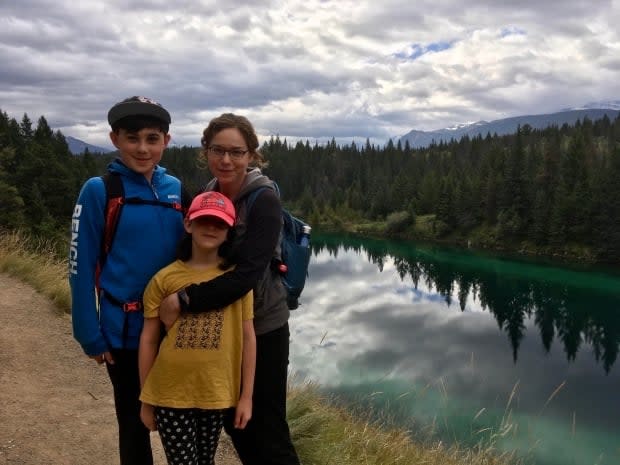Alberta parents, students tire of the off-again, on-again school roller-coaster

Terri Tomsky and her husband were already debating pulling their two kids out of school when word came on Tuesday afternoon: older students in Edmonton schools were moving to online classes — again.
The move, prompted by a rising number of students and staff in isolation and a shortage of substitute teachers, is the latest plunge on the pandemic roller coaster of this on-again, off-again school year.
Although Tomsky can work flexible hours from home, she says she's frustrated because the chaos in education could have been avoided.
"I just feel like the schools have been thrown into this crisis, and that crisis is the government's making, because anyone could predict this," she said.
Students in Grades 7 to 12 in public and Catholic schools in Edmonton, Calgary and Fort McMurray are all moving to online classes for at least two weeks as variants of concern drive a third wave of COVID-19 in Alberta.
All junior and senior high students across the province were also learning online for about a month before the holiday break, and almost all Alberta students learned remotely for a week in January.
Thousands more students who were exposed to COVID-19 at school hopped rapidly to online learning while in isolation.
Although the education minister has insisted the pandemic hasn't interfered with most students' learning, Sofia Calderon sees it differently.
At an NDP news conference Wednesday, the Grade 12 Ross Sheppard student said the quality of online experiences can't compare to being in the classroom.
"A lot of [student], they just lose motivation," she said. "When your workstation is your bed, it's a little harder to sit down and commit yourself to two and a half hours of class."
After more than a year of shunting back and forth, Calderon is questioning how prepared she is for her first year of university.
Salvaging the school year
At the news conference, NDP education critic Sarah Hoffman said there is still time to make schools safer for the last two months of the school year.
She called on the UCP government to use $30 million from its COVID-19 contingency fund and hire 2,000 newly trained teachers to split students into smaller classes.
Later, in the legislature, Premier Jason Kenney said the Alberta government has taken extraordinary measures to ensure schools run safely. He dismissed the NDP's idea and said the Opposition was sowing fear that schools are unsafe.
"The NDP's deeply socialist conviction is that we can even make a pandemic go away by spending money," Kenney said. "Signing cheques does not stop viral spread."
However, upgrading school ventilation systems and capping class sizes would help, Tomsky said, pointing to other countries that took those steps and were able to keep students more consistently in school.
"We're not doing that here," she said. "They are reactionary instead of anticipatory. They're always a couple of steps behind. I don't see them prioritizing schools."
Edmonton parent Greta Gerstner is frustrated by what she sees as half-measures to combat the of COVID-19.
She says it makes no sense that she can go to a store and buy a pair of shoes, but some schools are now closed to in-person classes.
She's baffled about why her son in Grade 6 can return to a crowded classroom, where kids eat lunch together without masks, yet her daughter in Grade 8 needs to be at home.
Earlier in the pandemic, Gertsner had to switch jobs so she had more flexibility to work from home where she could supervise her kids.
"I don't think the decisions that are being made are in the best interests of all students," she said. "I think a lot of it is just politically motivated."

